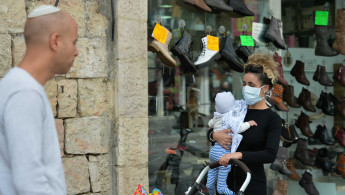Negligence in crisis: Palestinian citizens of Israel 'not being tested for coronavirus'
The Palestinian-Israeli Citizen Rights Association sent a plea to the director general of the Israeli ministry of health on Monday calling for an investigation into the low coronavirus diagnoses among the country's Palestinian population.
"The concentration of medical resources is limited to Jewish towns and is absent in the Arab towns," the letter urged.
Out of 3,865 reported coronavirus cases in Israel, only 38 are Israeli-Palestinian. This is despite one-in-five Israeli citizens being Palestinian.
While statistics point to widespread discrimination in healthcare against Palestinian-Israelis, media has portrayed Arab citizens as refusing tests due to an alleged stigma about the disease among their community - a claim utterly rejected by activists.
"Claims of Palestinians having a stigma around coronavirus and not wanting to be tested are false and campaigns by Palestinian-Israelis for the government to be more proactive is proof of this," Myssana Morany, attorney for Palestinian-Israeli rights group Adalah told The New Arab.
Systematic discrimination
The lack of provisions for Palestinian citizens of Israel is not a new phenomenon. It is often claimed that the treatment of Arabs as second class citizens is deeply embedded in Israel's socio-political fabric.
Although there are no overt laws denying Palestinian citizens equal access to healthcare, the overarching social, legal and political spheres within Israel has created a breeding ground for unequal treatment, lawyers and activists have said.
|
||
"The Israeli priority to test its Jewish population and forget about its Palestinian population stems from the Israeli racism represented in the national law, which ultimately puts its Jewish citizens above Arab citizens," Lubna Al-Ghoul, a Jerusalem-based Palestinian lawyer told The New Arab.
The Nation State Law, enacted in July 2018, defines Israel as a "nation-state of the Jewish people". This effectively downgrades Israel's Palestinian population to a second tier of citizenship.
Lack of accessibility
Palestinian citizens of Israel are also unable to readily access information about the coronavirus, due to the advise being published primarily in the Hebrew language.
"Israel's health ministry has been taking long stretches of time to translate vital information into Arabic for its Palestinian citizens," Morany explained.
She said that in Jewish-Israeli areas residents have the best care for coronavirus, including drive-thru test centres, effective public hospitals, and - in some cases - an easier time social distancing, due to their often larger homes.
In Palestinian areas, crumbling infrastructure due to decades of neglect has led to a lack of testing for suspected coronavirus carriers.
"One shocking case of Israeli negligence is in the Negev. There are no clinics and Israeli ambulances don't even enter the highly populated Palestinian region," Morany explained.
The Negev region has 80,000 residents in villages often unrecognised by Israeli authorities, resulting in limited access to water, electricity, and phone coverage.
Even if the information from Israel's ministry of health about the coronavirus crisis was translated into Arabic effectively, residents in these areas would often not have internet to access it.
"Israel has continued its neglect by refusing to even build temporary makeshift testing centres, let alone hospitals," Al-Ghoul said.
On Monday afternoon, Israel began to implement a number of testing centres in some Arab-majority towns after mounting pressure from Palestinian-Israeli politicians and activists.
However, in many urbanised Arab areas, such as Nazareth, there are often no public hospitals, meaning the healthcare burden is placed on private clinics.
Those without the means to access private healthcare often have no alternative readily available service, Morany said.
Read also: Demolitions in Negev and the forgotten plight of Palestinian Bedouins
Even labourers who enter Israel’s Jewish areas from the West Bank are deprived of adequate care - often stranded between the two areas and left in crowded quarantine centres in Israel.
"Those labourers are forced to sleep in overcrowded accommodation, or on the floors of their workplace," according to Morany.
Exploiting to abuse prisoners
In Israeli prisons, Palestinian citizens are also at risk of the coronavirus.
According to Morany, prisoners are unable to practice social distancing, or other measures, to protect themselves from the virus.
Read more: Coronavirus under occupation: Palestinian detainees in Israeli jails fear the worst
"There are usually six to eight people living together in a cell, which means they can't distance enough. Hand sanitisers and disinfectants are not being given to prisoners so they aren't able to keep their areas clean,” she said.
Prisoners are also banned from seeing visitors.
"The contradiction here is the prisons are not providing adequate care but they want to ban visitors. This effectively cuts off prisoners from society, so there is no way of knowing if prisoners are being mistreated or abused," Morany explained.
Diana Alghoul is a journalist at The New Arab.
Follow her on Twitter: @SuperKnafeh and Instagram: @flowerknafeh





 Follow the Middle East's top stories in English at The New Arab on Google News
Follow the Middle East's top stories in English at The New Arab on Google News


